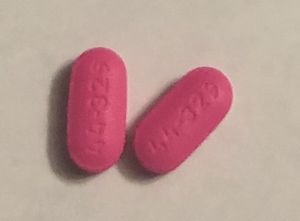Diphenhydramine
Diphenhydramine or diphenhydramine hydrochloride is a commonly used antihistamine, which is also used for coughs, to aid sleep, for certain symptoms of Parkinson's disease, as well as for allergy symptoms, bites, itching and eczema.[1][2] Diphenhydramine is the active ingredient in Benadryl, which is sometimes used as a sleep aid as well as an anti-histamine.[1]
Additional active ingredients[edit | edit source]
Many products containing diphenhydramine contain other ingredients, for example:
- acetaminophen (paracetamol) for night-time pain relief
- expectorants like guaifenesin, or dextromethorphan hydrobromide in cough products[3]
- levopenthol, a decongestant and pain reliever[3][4]
Other common ingredients include:
- ethyl (a form of alcohol), especially used in cough syrups
- lactose, which is common in many tablets
- food colorings, especially reds and blues[3]
Brand names[edit | edit source]
Diphenhydramine is marketed under many different brand names including:
- Allermax
- Banophen
- Benadryl
- Benylin Chesty Coughs Original and Benylin Mucus Cough Nights (syrup)
- Compoz Nighttime Sleep Aid
- Covonia Nighttime Forumla
- Diphedryl or Diphenhis
- Nytol One-A-Night
- Nytol QuickCaps
- QlearQuil Nightitme Allergy Relief
- Siladryl Allergy
- Silphen Cough
- Sominex original
- Tranquil
- Twilite
- Vanamine PD
- Unisom Sleepgels maximum strength
- Z-Sleep
- ZzzQuil[1][5][6]
Theory[edit | edit source]
Evidence[edit | edit source]
Clinical trials of the effects of diphenhydramine on ME/CFS patients have not been conducted.
Long COVID[edit | edit source]
Two female patients have been reported to have experienced rapid and significant improvements in their Long COVID symptoms after taking diphenhydramine, in particular in exercise tolerance and post-exertional malaise. The patients used doses of 50mg and 25mg of diphenhydramine respectively, with one of these patients also responding to 50mg hydroxyzine pamoate.[7] These effects did not occur using fexofenadine.[7] Pinto et al. (2022) stated that some COVID-19 patients had improved after antihistamine treatment, and according to Natalie Lambert, long covid patients in a Survivor Corps social media group has frequently posted about antihistamines. Glynne et al. (2022) also commented on anecdoteal reports of long COVID patients improving with antihistamines, and the role of histamine in COVID-19.[8] Glynne et al. conducted a small observational study using a combination of H1 (loratadine or fexofenadine) and H2 (famotidine or nizatidine histamine receptor antagonists (HRAs) for a minimum of 4 weeks, finding clinically significant improvement in the majority of patients.[8]
Dosage[edit | edit source]
The usual dose suggested is:
- creams for bites, itches or eczema - apply a thin layer once or twice a day
- allergies and hayfever, itching or as an anti-histamine - 25mg to 25mg, 3 or 4 times a day
- cough and cold symptoms – diphenhydramine is typically mixed with other medicines, the dose depends on the medicine
- creams for bites, itches or eczema - apply a thin layer once or twice a day
- sleep problems or insomnia - 25mg to 50mg[2]
Risks and safety[edit | edit source]
Diphenhydramine has a wide range of side effects include dizziness and drowsiness (sedation), and is sometimes used for insomnia.[1]
It is described as non-addictive/not habit forming, but recently concerns have been raised about long term use including the reduced effectiveness in the long term, causing people to increase the dose.[9] Theoharides and Stewart (2016) stated that in high risk over 65s taking 50mg for 3 years or 50mg for 3 years was associated with cognitive dysfunction.[9]
Using a product containing diphenhydramine marketed for nighttime pain, coughs or cold and flu, also involves the side effects of other active ingredients, or from inactive ingredients such as food colorings.[3][6]
Costs and availability[edit | edit source]
Diphenhydramine is available over the counter, under many different brand names including Benadryl.[1] Diphenhydramine is available in tablet, capsule or syrup/liquid form, and in anti-histamine products as a cream, spray or ointment to be applied to the skin.[10]
In the UK, diphenhydramine is a pharmacy-only medication and is not given on prescription.[3] Diphenhydramine is available under the brand names Benylin Chesty Coughs, Histergan, and Nytol Once-A-Day.[2]
Notable studies[edit | edit source]
- 2022, Long COVID following mild SARS-CoV-2 infection: characteristic T cell alterations and response to antihistamines[8] - (Full text)
- 2022, Antihistamines for Postacute Sequelae of SARS-CoV-2 Infection[7] - (Full text)
See also[edit | edit source]
Learn more[edit | edit source]
- Diphenhydramine - drugs.com
- Diphenhydramine - NHS
- Diphenhydramine - WedMD
References[edit | edit source]
- ↑ 1.0 1.1 1.2 1.3 1.4 "Diphenhydramine Uses, Dosage & Side Effects". Drugs.com. Retrieved November 9, 2020.
- ↑ 2.0 2.1 2.2 "Diphenhydramine (including Nytol Original & Histergan): drowsy antihistamine". National Health Service. September 21, 2018. Retrieved February 14, 2021.
- ↑ 3.0 3.1 3.2 3.3 3.4 "Search results - Diphenhydramine". Electronic Medicines Compendium. Retrieved February 13, 2021.
- ↑ "Levomenthol". Drugs.com. Retrieved February 13, 2021.
- ↑ "£8.59 - Benylin Chesty Coughs Original 300ml". Weldricks Pharmacy. Retrieved February 12, 2021.
- ↑ 6.0 6.1 "Covonia Night Time Formula - Summary of Product Characteristics (SmPC)". Electronic Medicines Compendium. Retrieved February 13, 2021.
- ↑ 7.0 7.1 7.2 Pinto, Melissa D.; Lambert, Natalie; Downs, Charles A.; Abrahim, Heather; Hughes, Thomas D.; Rahmani, Amir M.; Burton, Candace W.; Chakraborty, Rana (February 7, 2022). "Antihistamines for Postacute Sequelae of SARS-CoV-2 Infection". The Journal for Nurse Practitioners. 0 (0). doi:10.1016/j.nurpra.2021.12.016. ISSN 1555-4155. PMC 8820139. PMID 35153633.
- ↑ 8.0 8.1 8.2 Glynne, Paul; Tahmasebi, Natasha; Gant, Vanya; Gupta, Rajeev (January 2022). "Long COVID following mild SARS-CoV-2 infection: characteristic T cell alterations and response to antihistamines". Journal of Investigative Medicine. 70 (1): 61–67. doi:10.1136/jim-2021-002051. ISSN 1081-5589. PMC 8494538. PMID 34611034.
- ↑ 9.0 9.1 Theoharides, TC; Stewart, JM (2016). "Antihistamine and mental status" (PDF). J Clin Psychopharmacol. 36 (3): 195–7.
- ↑ "Diphenhydramine Oral: Uses, Side Effects, Interactions, Pictures, Warnings & Dosing". WebMD. Retrieved February 13, 2021.


